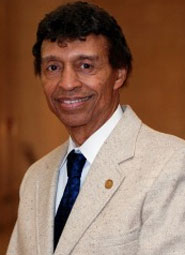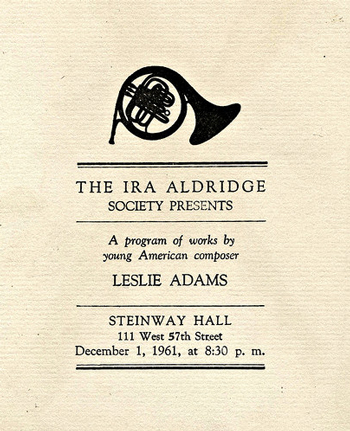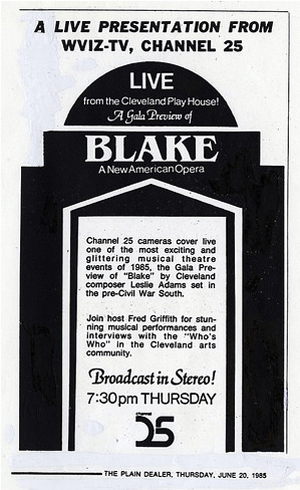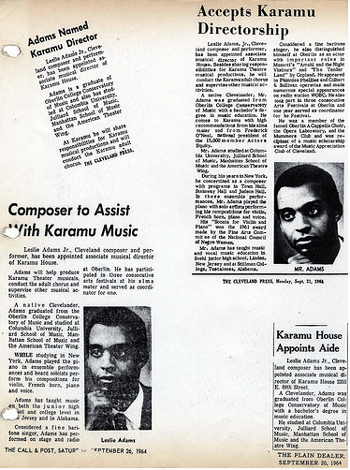by Mike Telin

“Leslie Adams’s output of music is incredibly diverse,” said Michael Dalby, Music juror for the Cleveland Arts Prize. He’s well known internationally for his art songs and his solo piano works. He also wrote an opera as well as chamber and orchestral works.” I’ve always been impressed with his humility, his quiet strength. It’s nice to be able to award the prize to someone so deserving.”
Dalby said that although he needed to excuse himself from voting because of a professional conflict of interest, the other members of the music jury decided to put Leslie Adams’s name forward for consideration of the Lifetime Achievement Award. “The music jury looked at his life’s work, his compositional output, his activities within the community such as his involvement with Karamu House, with church groups around the city, and his championing of music education. I couldn’t be more pleased because for this award, each discipline places their nomination in front of all of the other disciplines. So it’s not just musicians voting for musicians. And the jury-at-large decided that he was worthy of this honor.”
Born and raised in Cleveland, Leslie Adams began studying the piano at the age of four at the encouragement of his parents. “There was a woman by the name of Dorothy Smith who lived two houses down. She was a violinist in the Cleveland Women’s Orchestra, but she also played the piano, so they asked her to give me lessons,” Adams recalled during a telephone conversation. “They bought me a piano, and she came to our house. I had one lesson a week, and I had to practice one hour every day. My parents also got me a paper route, and those two things kept me very busy. I enjoyed it though — I thought it was wonderful, and they had no complaint from me.” Adams said that his mother later confessed to him that she and his father didn’t necessarily have it in mind for him to become a musician, they simply wanted to expose him to culture.
Adams also began to dabble in composition at an early age. “As a child, one of my first music books had pages of blank music staves in the back, and I started writing down notes that imitated some of the music I was playing. At first they were just melodies, but gradually I began to add a bass line.” While in high school, Adams would arrange pop tunes for his classmates to sing. “I was also in a church choir, and I would arrange music for it as well.”
Adams went on to study music education at Oberlin, where he also began to seriously study composition. “Studying music education was my parents idea. They said it would be good insurance for me, but again, I didn’t complain, I was just glad to be at Oberlin, in the Conservatory, and surrounded by music every day. I enjoyed going to lessons and classes. It was a wonderful environment. There were afternoon music socials in the dorms, and I would compose pieces for those. There was also a student-run Mummers Club that I joined, which gave me another outlet to compose and arrange music.”
While at Oberlin, Adams was introduced to the world of art song, a genre that would later bring him international acclaim as a composer. “Although my degree was in Music Education, I still had to select a major, and I had a triple major of Voice, Piano, and Composition. I also started singing with the Oberlin College Choir, which rehearsed twice a week. Robert Fountain, the director, was an outstanding choral conductor and I was assigned to him for voice lessons, which I had twice a week during every semester I was there. With him, I went through the entire baritone repertoire — I sang all of the Italian arts songs, German lieder and French chansons. I was very vocally oriented, and I think that sets me apart from a lot of composers. Many write for the voice, but they don’t have the extensive vocal training and background that I have.”
Adams’s art songs have been performed by many of the world’s leading vocalists. Soprano Martina Arroyo, mezzo-soprano Denyce Graves, tenor Seth McCoy, baritone Ben Holt and bass Mark Doss, to name a few, have all performed Adams’s music.
While the composer is proud of his art song catalogue, he pointed out that he has written an equal number of instrumental compositions. “I didn’t want to be known as a song writer, I wanted to be known as a classical composer. I had always written for instruments, but after Oberlin I went gung-ho and wrote sonatas for the violin, cello, and horn. I also wrote some short piano pieces, and became involved in instrumentation and orchestration.” His latest large-scale work, the Twenty-six Etudes for Solo Piano, was completed in 2007, and has been recorded by Maria Thompson Corley and Thomas Otten. (Read ClevelandClassical.com’s review here.)
After graduating from Oberlin in 1955, Adams continued to study composition privately in New York City. He went on to earn a master’s degree from the University of California, Long Beach, and a Ph.D. from The Ohio State University. He has held teaching positions at Florida A&M University, and the University of Kansas. It was during his time at Kansas that he was presented with an opportunity to compose an opera. That opportunity also led him to make the decision to return to his hometown.
“No matter where I was, I always thought of Cleveland as my home,” Adams said. “At Kansas I was an associate professor of music, and I conducted the concert choir. During my last year I was assigned to administration, which was an opportunity that I thought might open the door for me to have more time to compose. But what I found was that administrators are very busy people,” he said with a laugh. “They have a lot of meetings to attend, and they don’t have the time off that regular teachers have. I had been at the University for eight years, and when I was presented with this opera opportunity, I realized that I wanted to devote my time to composing it. So I resigned under favorable conditions and came home to Cleveland. That was a big but important step for me and luckily I didn’t need to consult with anyone — I wasn’t married, and I had no children. It was a little scary, but I was determined to compose this opera.”
Blake, an opera in four acts, with text by Daniel Mayers recounts the story of a slave who, on the eve of the Civil War, resolves to lead his people out of bondage and to a life of dignity. “I really put my all into the opera, and, although it has yet to be staged, it is one of my favorites.” In May, 2006, excerpts from Blake were performed by the New York City Opera Company during its VOX Showcase festival.
After returning to Cleveland, Adams immersed himself both in composing and the cultural life of the city. “Cleveland is a very good place to be because you can get into the social scene as much as you want, or you can retreat into work. And, no one bothers, you which has its advantages. It’s very quiet and easy to get around. And, it’s top-notch when it comes to the arts. Everything is very high-class.”
Today, in addition to composing, Adams enjoys his work as music director at Grace Presbyterian Church in Lakewood, a position he has held for nineteen years. “I love it and it’s very healthy for me. It balances my creative work, which is very isolated, with engaging socially. And, there is nothing more enjoyable than music, it’s a wonderful environment.”
What is Adams currently working on? “Right now I’m composing my first piece for trumpet, and it’s going well. The piece before this was for piccolo, flute and piano.”
In addition to Blake, does he have any other favorite compositions? “Every piece that I write is my favorite. I finish it and think. ‘Oh I love it,’ but then go on to the next.”
What was his reaction to receiving a Cleveland Arts Prize? “I was very pleased and honored, but I was surprised to receive the Lifetime Achievement Award. It sounds a little final,” he said laughing. Of course a composer never retires, so I look at it as a lifetime up until this point, and that’s OK with me. I take pride and pleasure in what I have done, and I work hard at getting it just right. I am true to my core values, and that gives me a great deal of satisfaction, but I still have a lot of music to compose, and a lot of different life experiences to have.”
Published on ClevelandClassical.com June 22, 2015.
Click here for a printable copy of this article







